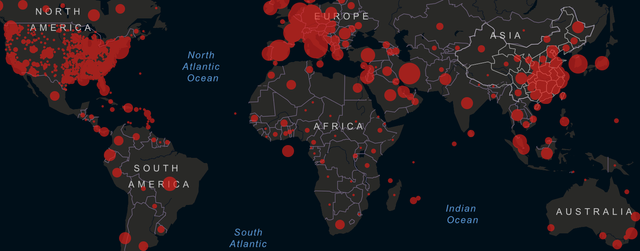COVID-19: Lessons for leaders, from our leaders and are you ready for what comes next?

The qualities of leadership make a difference in times of crisis. How are our world leaders stacking up?
COVID 19 – so you survived the initial assault and are still afloat, but are you ready for the marathon that comes next?
As the world hurtles toward a head on collision with the heaviest economic impacts of the Coronavirus, business leaders are going to face many, many challenges, and of a scale most have never experienced.
How well, and in fact if, our businesses come through this will depend to a great degree on the quality of the leadership we exhibit from the top.
Not for one moment should anyone take for granted that their business will survive the coronavirus. The finest examples of leadership can still be overwhelmed by bad luck – simply being in the wrong place, or the wrong industry when a crisis strikes, may render great leadership redundant.
What I firmly believe is leaders need to plan as if they ARE going to make it.
I thought it might be interesting to briefly look at the contrasting performance of three high-profile leaders through this crisis: Boris Johnson of the UK, Donald Trump of the US, and Scott Morrison of Australia.
I stress these are my personal opinions and observations only. I’m sharing them in an effort to reflect on personal lessons and perhaps influence my own approach over the coming weeks and months.
Five key leadership skills in crisis management
I am sure others rely on different skills or place higher emphasis on some than others. In my mind, mission-critical skills during a crisis are:
Communication
This is probably the most important – the capacity to be clear, concise and calm.
Adaptability and Creativity
These are two distinct skills, but very closely linked in my view. One begets the other.
Plans will be made today and have to be reworked in an hour when new information comes to light, and reworked an hour later, and then repeat, maybe countless times. Top managers can see when a plan is failing and are quickly able to reassess and realign their teams. I would also say that having an inflated ego is not good for adaptability, but more about that below.
After recognition and acceptance of failure, leaders then need to think outside the box. They must quickly realise they don’t have the answers or innately know what to do. They need to open up the room to the ideas of others that come from out of left field and then join the dots themselves as workable solutions start to present themselves.
Emotional Control
In times of great stress, the ability to make rational decisions, communicate clearly and work efficiently requires someone to be in control of their feelings or, as a minimum, to not allow their feelings to lead them.
Relationship Management
During a crisis, it is often necessary to throw your organisational chart, with its neatly structured lines of reporting and communication, out of the window.
Your war council may include technical experts who are buried deep in your business or even come from outside your organization.
There is often no time to work through slow reporting structures.
Leaders will find themselves communicating with a vast array of different people. Their ability to manage numerous relationships is essential, some with people they have never met before and others with people they previously didn’t know well.
Getting the war cabinet to quickly feel as if they are a team is an essential skill requiring high-level relationship management skills.
So how did my chosen three stack up?
I don’t rate myself a leadership expert, but like you, I can rate the three leaders I mentioned above, against these essential skills.
For the record, I used their performance during the early weeks of the pandemic when things were most fluid. As things have progressed around the world there has been a tendency for all leaders to see what is working in other parts of the world and fall into line with those responses, somewhat making their job easier.
The harder test of leadership, I believe, was closer to the beginning of the pandemic.
Also for the record, I actually wrote the bulk of this article some three weeks back but held it back because Boris Johnson was diagnosed with COVID-19, was hospitalised then went into intensive care. I did not want (god forbid) to be potentially kicking a man while he was down so we withheld the article from publication twice.
This pause though has enabled me to edit aspects of the article, and in particular use the leaders performance in the early stages of the pandemic, and then reflect on how well they may, or may not be able to manage the colossal changes required to rebuild their economies.
Donald Trump
While his communication skills don’t show him panicking, he is often confusing. He may be creative (I don’t know) but he appeared fixated on “his” path for too long, even in the face of something clearly not working. Trump appears slow to adapt to change.
Emotional control, or lack of it, is where things really start to fall apart for the US President. He appears so focused on himself and, as a result, seems unable to separate his feelings about himself from the reality of what needs to be done.
Relationship management for Trump is an out-and-out disaster. He would not foster much discretionary effort from anyone given the public bashings he loves to give out.
I give Donald Trump an epic fail for leadership in a crisis.
The way it is looking right now, the only reason America will get through (and I hope it does and we all need it to) this crisis is because a whole raft of public officials will put the greater good ahead of “their” own feelings despite constantly getting publicly beaten up by Trump.
Good on them.
Boris Johnson
I rate the PM of the UK a little better. He seemed slow to move but has picked up pace. Johnson has been criticised for not taking the virus seriously enough and being too focused on Brexit.
He appears to have clarified his messaging and parked his habit of making jokes. Calling the health department’s plan to access more ventilators as “the last gasp” was extraordinarily insensitive, if not plain stupid.
He also appears to be starting to exercise greater self-control when he is fronting the media.
The biggest issue for Johnson seems to be a result of the bruising election he recently came through – where he undoubtedly torched a lot of relationships along the way – and that includes having a relatively inexperienced cabinet. This makes it even more important for him to be able to reach deep into the public service and communicate with and motivate experts to contribute quickly and effectively.
Time will tell about PM Boris Johnson’s ability to lead during an extended financial rebuild. His political hero is Winston Churchill. Will this eventually be his “Churchill” moment and see him project a bit more gravitas?
Note: While I rated the three leaders’ early performance in handling the pandemic crisis, the situation changes daily. Boris Johnson was diagnosed with COVID-19 and spent a week in the hospital. On his release, he credited the NHS for saving his life. It will be interesting to see if this experience changes his leadership style once he fully recovers.
Scott Morrison
The PM of Australia gives the stand-out performance in my view. He started slowly, but perhaps because of his criticised performance during the devasting Australian bushfires, he seems to have quickly leapt into action. Morrison quickly formed a national council comprised of all state and territory governments and health departments as well as numerous relevant experts.
There have been daily meetings and communications, and press conferences if needed, where his is the consistent calm voice.
This is no mean feat in a country as large as Australia, with nine different state and territory governments, all with their own responsibility and budgets for health systems and at times, all with their own ideas about how to respond to the pandemic.
He doesn’t get angry when asked repeated questions but answers using fact-based information. He still appears to get defensive sometimes during questioning, something that seems to be an embedded trait.
I can’t comment on his adaptability and creativity, but he has consistently stated his plan for the next few days, with a caveat that it will be modified as required. There appears to be a genuine commitment to take advice, admit if something is not working, adapt and repeat.
Maybe Morrison is a man made for this moment.
We will only know at the end. The coronavirus crisis required governments to go hard and go early at the start, but now it needs to settle into a more sustainable pace. It will be akin to running a marathon a week for the next several months.
Morrison seems to recognise that government has largely raided the piggy bank and spent everything and that from here, business is key to the great restructuring ahead of us. His challenge will be to continue to foster the national bi partisan approach he has been so successful in creating until now.
In Summary
Despite my views on all three, I wish them and all their countries – as well as every other political and business leader in the world – the very best as we navigate these uncharted waters. Also spare a thought for the partners and families of these leaders. They are often the invisible rock for many of these public faces.
With that in mind, I plan to download one of the better movies about Sir Winston Churchill, Britain’s famous wartime Prime Minister. It won’t be the most recent Churchill as that was widely panned by war historians as completely exaggerating Sir Winston’s “faults”.
There are plenty of good Churchill movies around to remind us that a crisis will bring out the best in some leaders.
Let’s hope this is true in our current crisis.
I’d love to hear your views of essential qualities needed to manage and lead in a crisis. Get in touch with me directly or leave a comment.
Note: First written on the 25th March and edited on the 19th April.
